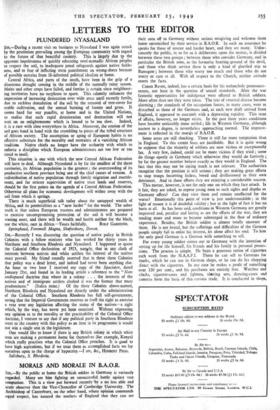LETTERS TO THE EDITOR
PLUNDERED NYASALAND
$lit,—During a recent visit on business to Nyasaland I was again struck by the pessimism prevailing among the European community with regard to the future of that beautiful country. This is largely due to the apparent hopelessness of quickly educating semi-nomadic African peoples to respect the soil, to inadequate penal safeguards against native fickle- ness, and to fear of inflicting stern punishment on wrong-doers because of possible outcries from ill-informed political idealists at home.
Central Africa, and parts of the south, have been in the grip of a disastrous drought coming in the middle of the normally rainy season. Maize and other crops have failed, and famine is certain since neighbour- ing territories have no surpluses to spare. This calamity enhances the impression of increasing desiccation over wide areas until recently fertile, due to reckless denudation of the soil by the removal of tree-cover for arable cultivation, and the annual burning of forests and grass. It seems hard for our pundits, at home and in the United Nations, to realise that such rapid deterioration and destruction will not wait on an enlightenment which is bound to be too slow. Indeed, it is a race with time everywhere in Africa. Moreover, the erosion of the soil goes hand in hand with the crumbling to pieces of the tribal structure of African society. The assumption or aping of European habits is no effective substitute for the morality and restraints of a vanishing African tradition. Native chiefs no longer have the authority with which to enforce a discipline which European administrators are too few or too timid to instil.
This situation is one with which the new Central African Federation will have to deal. Although Nyasaland is by far the smallest of the three territories, its African population is the greatest ; the overcrowding of its productive southern province being one of the chief causes of erosion. A redistribution of native population through family migration and resettle- ment, and far stricter supervision of native trust lands and reserves, should be the first points on the agenda of a Central African Federation. Otherwise all plans for economic development will wither away with the soil from which it springs.
There is much superficial talk today about the untapped wealth of Africa, and its potentialities as a "new larder " for the world. The sober truth is that unless European trustees and administrators are prepared to exercise uncompromising protection of the soil it will become a wasting asset, and there will be wealth and health neither for the black,
nor the white, race in Africa.—Yours faithfully, ROLF GARDINER.
Springhead, Fontmell Magna, Shaftesbury, Dorset.


































 Previous page
Previous page